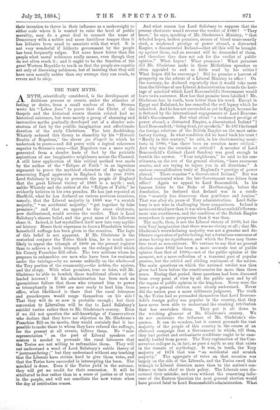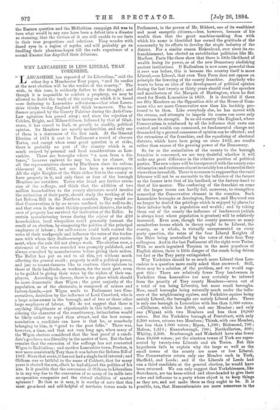THE TORY MYTH.
AMYTH, scientifically considered, is the development of fictitious persons or events, under the stimulus of feeling or desire, from a small nucleus of fact. Strauss wrote his " Leben Jesu" to prove that the Christ of the Gospels and the historical events therein related had no historical existence, but were merely a group of charming and instructive myths gradually developed out of a slender sub- stratum of fact by the prolific imagination and affectionate devotion of the early Christians. The late Archbishop Whately reduced this theory to absurdity by his "Historic Doubts of Napoleon," the clever jeu d'esprit in which he undertook to prove—and did prove with a logical coherence superior to Strauss's essay—that Napoleon was a mere myth generated from a slender basis of fact by the patriotic aspirations of our imaginative neighbours across the Channel. A still later application of this critical method was made by the author of the "Eclipse of Faith" in an ingenious argument to prove the mythical character of the agitation concerning Papal aggression in England in the year 1850. Lord Salisbury is trying to persuade the people of England that the great Liberal victory of 1880 is a myth ; and, unlike Whately and the author of the "Eclipse of Faith," he evidently believes in his own paradox. He has just repeated at Sheffield, what he has declared on various previous occasions, namely, that the Liberal majority in 1880 was "a scratch majority," "an accidental majority," "got together by false promises ;" and that an appeal to the same electorate, now disillusioned, would reverse the verdict. That is Lord Salisbury's sincere belief, and the great mass of his followers share it. Indeed, it had' crystallised itself now into very mythi- cal history. Hence their eagerness to force a Dissolution before household suffrage has been given to the counties. The logic of this belief is not apparent. If Mr. Gladstone is the oratorical conjurer the Tories think him, he is much more likely to repeat the triumph of 1880 on the present register than to achieve a fresh triumph on the enlarged field which his County Franchise Bill offers. The two millions whom he proposes to enfranchise are men who have been for centuries under the tutelage—by no means unkindly on the whole—of the Tory portion of the community,—the nobles, the squires, and the clergy. With what promisei, true or false, will Mr. Gladstone be able to bewitch these traditional clients of the landed interest ? If his administration has been such an ignominious failure that those who returned him to power so triumphantly in 1880 are now ready to hurl him from office, what likelihood is there that the rural labourers and gamekeepers would range themselves on his side ? That they will do so now is probable enough ; but their conversion to Liberalism will be due to Lord Salisbury's suicidal tactics rather than to Mr. Gladstone's oratory. Even if we did not question the self-knowledge of Conservatives who declare that they have no objection to Mr. Gladstone's Franchise Bill on its merits, they would certainly find it im- possible to make those to whom they have refused the suffrage, for the present at all events, believe them. No "mis- representation " on the part of Liberal speakers or orators is needed to persuade the rural labourers that the Tories are not willing to enfranchise them. They will not understand a word of Lord Salisbury's subtle theory of " jerrymandering ;" but they understand without any teaching that the Liberals have striven hard to give them votes, and that the Tories have succeeded in intercepting the boon. The mischief is done. Even if the Tories yield in the autumn, they will get no credit for their concession. It will be attributed to fear rather than to a sense of justice or of trust in the people, and will not conciliate the new voters when the day of retribution comes.
And what reason has Lord Salisbury to suppose that the present electorate would reverse the verdict of 180? "They know," he says, speaking of Mr. Gladstone's Ministry, " that deluded hopes, broken promises, oceans of blood unnecessarily shed, a weakened prestige of power abroad, a distracted Empire, a discontented Ireland—that all this will be brought up against them, and an account will be demanded of them, and therefore they dare not ask for the verdict of public opinion." What hopes ? What promises ? What promises did Mr. Gladstone make in those Midlothian speeches so often appealed to and so little read by his critics What hopes did he encourage ? Did he promise a harvest of prosperity on the advent of a Liberal Ministry to office ? On the contrary, he declared repeatedly that it would take more than the lifetime of one Liberal Administration to undo the heri- tage of mischief which Lord Beaconsfield's Government would leave to its successor. How has that promise been falsified ? Mr. Gladstone has, in truth, been better than his word. Except in Egypt and Zululand, he has cancelled the evil legacy which he inherited. And he has not succeeded as yet in Egypt, because he is fettered by the international engagements of Lord Beacons- field's Government. But what about "a weakened prestige of power abroad, a distracted Empire, a discontented Ireland"? Lord Beaconsfield, "being dead, yet speaketh." In 1874 he found the foreign relations of the British Empire on the most satis- factory footing. In what condition did he hand back his trust ? "Rarely in this century," he said, in his electioneering mani- festo in 1880, "has there been an occasion more critical."
And why was the occasion so critical ? A member of Lord Beaconsfield's Cabinet (Lord Sandon) was good enough to furnish the answer. "Your neighbours," he said to his con- stituents, on the eve of the general election, "have enormous armies, and are trying to injure you in all directions." A curious exemplification truly of England's "prestige of power abroad." There remains "a discontented Ireland." But was Ireland contented when the late Government was driven from office ? Again we appeal to Lord Beaconsfield. In his famous letter to the Duke of Marlborough, before the dissolution, he declared that Ireland was in a condi- tion scarcely less disastrous than pestilence and famine." That was after six years of Tory administration. Lord Salis- bury is not wise in challenging these comparisons. Ireland is more contented now than it was when Lord Beaconsfield's Govern- ment was overthrown, and the condition of the British Empire everywhere is more prosperous than it was then.
The myth, then, is not the Liberal victory of 1880, but the vain Tory imagination that there was no victory at all ; that Mr. Gladstone's overwhelming majority was not a genuine and de- liberate expression of public feeling, but a fortuitous concourse of atoms having no significance, and which the Peers may there- fore treat as non-existent. We venture to say that no general election since 1832 has been a more accurate test of public opinion than that of 1880,—not of the public opinion of the moment, not a mere reflection of a transient gust of popular passion, but the settled and abiding sentiment of the nation. The main questions on which the national verdict was then given had been before the constituencies for more than three years. During that period these questions had been discussed from every point of view by all the public men and by all the organs of public opinion in the kingdom. Never were the issues of a general election more clearly understood. Never did the nation pass a more deliberate judgment. The truth is, the Tories had so persuaded themselves that Lord Beacons- field's foreign policy was popular in the country, that they have never been able to understand the crushing retribution that has overtaken them. They put it all down to the witching glamour of Mr. Gladstone's oratory. We do not underrate the influence of Mr. Gladstone's elo- quence. It can do wonders, but it cannot persuade the vast majority of the people of this country in the course of an electoral campaign that a Government in which, till then, they bad perfect and enthusiastic confidence ought to be sum- marily hurled from power. The Tory explanation of the Con- servative collapse is, in fact, as pure a myth as any that exists in the domain of mythology. It was, in truth, the Tory majority of 1874 that was "an accidental and scratch majority." The aggregate of votes on that occasion was largely on the side of the Liberals, and the Tories owed their triumph to Liberal disunion more than to the nation's con- fidence in their chief or their policy. The Liberals soon dis- covered their mistake, and even without the cementing influ- ence of the Eastern Question the next general election would have proved fatal to Lord Beaconsfield's administration. What
the Eastern question and the Midlothian campaign did was to turn what would in any case have been a defeat into a disaster so stunning, that the victims of it are still unable to see facts in their true proportions and relations. They wander with dazed eyes in a region of myths, and will probably go on fondling their phantom-hopes till the rude experience of a second disaster has dispelled their delusions.



































 Previous page
Previous page